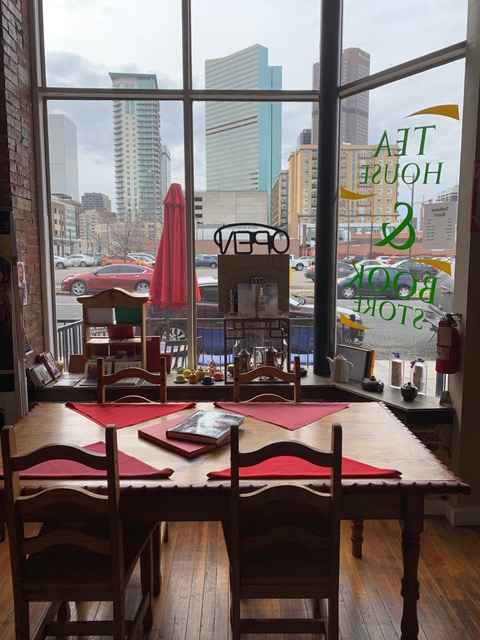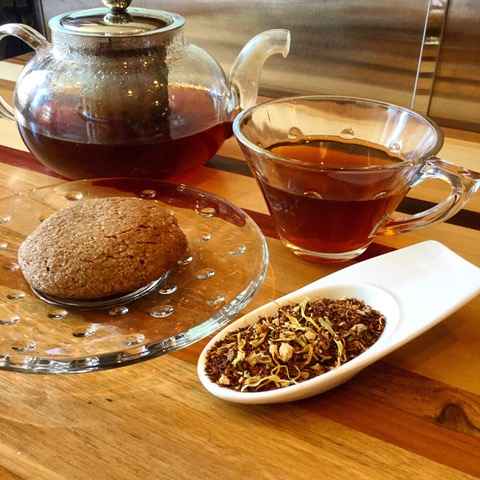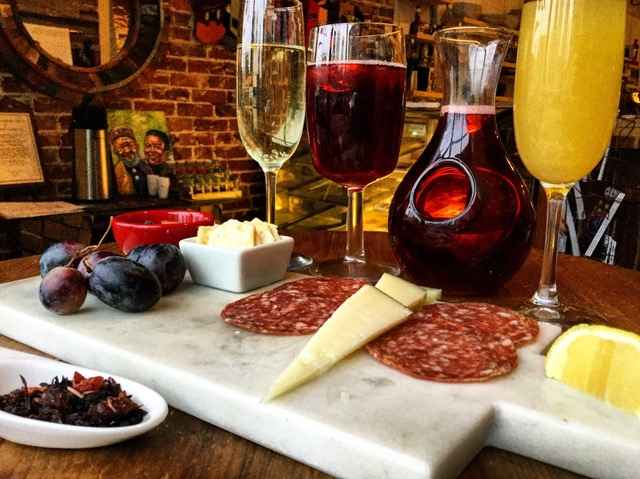Risë Jones’ 2020 was A Lot™. Like operators across the state, she rode a roller coaster of emotions related to her business, TeaLee’s Tea House and Bookstore in Denver’s Five Points neighborhood, and COVID. Then there were last summer’s racial justice protests, general political upheaval, and the death of her husband and business partner.
TeaLee’s celebrated its second birthday on February 20, 2020, ushering in the Terrible Twos with a vengeance. By mid-March, Jones started to feel a few ripples from COVID, even before the Denver’s restaurants were shut down on March 17. “On Friday [March 13], we started getting cancellations of events because we had a couple of big events on the books,” she recalls. “First it just felt like people were being cautious. By Monday, I thought I didn’t want to bring anything into our house—my mother’s still with us and she lives very close to me.”

She remembers talking through the options with her husband and TeaLee’s co-owner, Louis Freeman. As it turns out, the two didn’t have long to wait before they involuntarily closed the tea shop’s doors, thanks to Denver’s public health orders. And when liquor stores were briefly deemed non-essential and ordered to close, Jones chuckled at the reaction of panicked Denverites: “I don’t know what it says about us,” she says, “but I saw that line around Argonaut. It was serious.”
Jones explored large loan and grant programs like PPP (which TeaLee’s didn’t qualify for because she and Freeman ran the business alone) and LISC grants without success. Still, they were able to reopen during the summer with limited seating, and were even able to bring on a couple of employees.
But on September 25, Freeman died unexpectedly. “We closed Friday the 25th, and reopened the next Thursday. The reopening was for a selfish reason—just to keep me going.”
So far, Jones has kept going—she even seems cautiously optimistic. Here’s the rest of our Q&A with her about how TeaLee’s made it through the November shutdown, what Black History Month means to her as an African-American entrepreneur, and what she’s seen change since last summer’s racial justice protests (spoiler: not enough).
DiningOut: So, it’s been a year.
Risë Jones: It’s so funny you said that, because today I’ve been working and watching the impeachment trials. Everyone was so anticipating 2021—it was the magic of getting out of 2020—and this year started out no less dramatic.
DO: You reopened in July of last year after being closed for several months.
RJ: We went back in [to the shop] in July and were trying to meet the guidelines around distancing [doing takeout]. On August 20, we opened at 25 percent capacity, which meant we could have 12 people inside total. We were getting to the end of summer and people were out. The summer was helpful. Business was OK for COVID. The caveat is, it was OK for COVID.
Then on September 25, my husband passed away. We were both getting ready to go to the tea house. He had a heart attack and passed away that day. We had just hired two people and they were stunned, but they agreed to come back. I couldn’t have opened up the doors without them.
DO: What happened then?
RJ: About two weeks before Thanksgiving we went to takeout. That was when COVID was at its peak. We’ve never operated particularly well with our food for takeout. People would occasionally order pastries or quiche to go, but…
DO: That’s not what you think of when you think of a tea house. You think of the teacups and teapots, the ritual of it.
RJ: You got it. We were just handing people stuff over the counter. From Friday after Thanksgiving to Christmas weekend, that’s the shopping season. Events bring in significant money, but we couldn’t do events. We also do high and afternoon tea, but we couldn’t do high tea.
Around Christmas, I said, “This isn’t going to work, just doing cups of tea and coffee to go.” We’d had the vision to do more accessories and books, so around for the holidays I was able to increase our retail capacity. That was able to make up for a portion of us not being able to sell food. Five Points did a holiday stroll. We passed out hot chocolate and tea samples outside, but because we could do retail I could let people come in. We had one of the more phenomenal days that we had in December. We did a waffle pop-up, collaborating with another business, and between the two of us we were pleased with how that worked out.
We have a liquor license, but I really didn’t want…it was a choice. You can do to-go alcohol, but the thought I always had was, “Who are we after this? How do you survive? How do you retain some semblance of service? And when things are different, how do you retain who you are?”
DO: You didn’t qualify for PPP last year because you didn’t have any employees at that time. Will you apply this round?
RJ: Absolutely, I am going to apply. As a small business, you do whatever you need to do to survive. Capital is always an issue for a business. That was one of our strategies for surviving; you have to have capital and employees to grow. Our goal in 2020 had always been to scale up. [My husband and I] knew when we reopened we couldn’t do it with just the two of us. I can’t function now without employees.
DO: Were you able to secure any other sources of COVID relief?
RJ: What got us open were small community grants. Grants came along through people in the community. They’ve said, “What can I do? We don’t want TeaLee’s to go away,” and when someone knew about a grant opportunity they said, “Do you know about this?” [Denver District 9 City Councilperson] Candi CdeBaca, she genuinely cares about the people. She comes in, she checks in, she wants you to participate in the council meetings. She’s been really good.
It hasn’t been the large national grants. The LISC grant advertised on the Super Bowl? I have literally applied for that three times (and I will apply for that again). It’s been Colorado, Denver, and anything that happens in District 9.
DO: What’s next?
RJ: We went to 50 percent, that’s 20 people. If we have 20 people a day that begins to feel more like normal. Going into February, we had a customer [who used to] do a group meeting. We got that group meeting Friday [February 5] which felt really good. We had a phenomenal Friday and Saturday.
Overall, I see the penlight in the horizon, in the distance—and I do say the distance. One of things is on February 20 we will be fortunate enough to be in business for three years. To be one that still exists is hard work, it’s not magic. I ache for those who aren’t surviving, but we are blessed. You have to make constant changes as you go through it and know who you want to be on the other side.

DO: What are some things you would like to see be different for young Black operators coming up?
RJ: No matter what it is you do, you want to be able to have some confidence—to be able to contribute, to not have fear, to not worry about being shot or killed. You want to thrive, not survive. Survival makes you weary. You want to be respected.
Think about Maslow’s hierarchy of needs. When you have those basic needs met, you move up that hierarchy. You want to find a way to provide for your community because you don’t need to worry about those needs.
You know, I think the pandemic has brought this about in our community and the general population: What the heck is education? If your aspiration is to leave high school and go to college…you can’t be a doctor, lawyer, or engineer without education (and we need all of those). [But] do you want $100,000 worth of debt when you come out of college? There are so many young people who can’t even get out of their parents’ basements because they can’t even get out of debt.
There’s been a lot of talk about entrepreneurship. How do you go into business for yourself? Create institutions in the community? Create wealth in your community by being an owner? All the things they teach you in business school are things you learn being an entrepreneur.
DO: Have you seen any systemic change since the BLM protests last year?
RJ: I’m going to say I think it’s too soon for that. When you talk about something that’s 400 years old, that’s so rooted in this country, it’s still going on. It’s happening every day. If you have a 400-year history of doing it, you have a 400-year history of denying it. It’s admitting all the things that have happened, and you can’t go where you want to be until you know where you are.
I am hearing more conversations. It’s ironic that we’re talking about this today and the whole impeachment trial is about the rise of nationalism. I’ve seen a period of awareness again and what comes out of that we’ll have to see. We have our first Asian and African-American woman of color as Vice President. I remember the feeling the day after Obama was nominated for the presidency: There was a sense of hope, an air of happiness. But what that presidency also brought on is where we all are now: the fear of the—ugh, I don’t like this word, but “minority”—becoming the majority.
We’re a divided nation. For me, you’re constantly involved because you take your activism wherever you go. You are doing it 24/7. You don’t turn it on and off because an incident happens—you live it every day. It’s every day; it’s not on TV; it happens when you sleep. It’s not that I’m not optimistic, but the last horrible incident isn’t the last one.
DO: It’s Black History Month. What does that mean to you?
RJ: Well, this is another time when we live Black history every day. It forces people, companies, and businesses to at least know one fact maybe they didn’t know about. But it just always reminds me that we live Black history all day, around us. I’m grateful to be an African-American female, to have the parents that I have, and be from the community that I am.
Talk to us! Email your experiences (and thoughts, opinions, and questions—anything, really) to askus@diningout.com.

